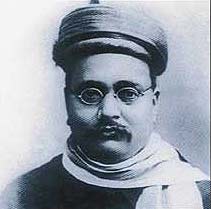Indian National Congress
Indian National Congress (INC), often simply called the Congress, is one of the two major political parties in India, the other being the Bharatiya Janata Party (BJP). Founded in 1885, it was the first modern nationalist movement to emerge in the British Empire in Asia and Africa. From the late 19th century, and especially after 1920, under the leadership of Mahatma Gandhi, Congress became the principal leader of the Indian independence movement. Congress led India to independence from Great Britain, and powerfully influenced other anti-colonial nationalist movements in the British Empire.
History[edit | edit source]
The Indian National Congress was founded in 1885 with the goal of obtaining a greater share in government for educated Indians. Over the years, the Congress became the principal leader of the Indian independence movement. Under the 19th and early 20th centuries, Congress was more of a debating society that held annual sessions where members expressed their loyalty to the British crown and used the platform to address civic issues. However, the dynamics changed significantly in the early 20th century, especially with the arrival of Mahatma Gandhi, who transformed the organization into a mass movement fighting for complete independence through non-violent means.
Following India's independence in 1947, the Congress emerged as the ruling party in the country. It has been credited with shaping the nascent nation's development, including the establishment of a secular and democratic republic. The Congress has been in power for most of India's post-independence history, with members of the Nehru-Gandhi family leading the party for many years.
Ideology[edit | edit source]
The Indian National Congress has traditionally been associated with a centrist position in Indian politics, advocating for a mixed economy where the government and the private sector co-manage the economy. The party supports social liberalism, seeking to balance individual liberty with social justice, and has historically advocated for policies aimed at benefiting the poor and marginalized sections of society.
Structure and Organization[edit | edit source]
The Congress Party is structured hierarchically, with the All India Congress Committee (AICC) at the top, followed by state committees, and district and block committees at the grassroots level. The Congress Working Committee (CWC), which consists of senior party leaders, is the executive committee of the AICC. The President of the Indian National Congress is the head of the party and is elected by the members of the AICC.
Electoral Performance[edit | edit source]
The Congress has had a dominant presence in Indian politics, having ruled the country for most of its post-independence history. However, its influence has waned in recent years, with the Bharatiya Janata Party becoming the dominant political force in India. Despite this, the Congress continues to play a significant role in Indian politics, often leading the opposition against the ruling BJP government.
Challenges and Criticisms[edit | edit source]
The Indian National Congress has faced several challenges and criticisms, including allegations of corruption, nepotism, and inefficiency. The party's reliance on the Nehru-Gandhi family's leadership has also been a subject of debate, with critics arguing that it undermines democracy within the party.
Conclusion[edit | edit source]
The Indian National Congress has played a pivotal role in India's history, leading the country to independence and shaping its post-independence trajectory. Despite facing challenges and criticisms, it remains a key player in Indian politics, advocating for policies aimed at promoting social justice and economic development.
Search WikiMD
Ad.Tired of being Overweight? Try W8MD's NYC physician weight loss.
Semaglutide (Ozempic / Wegovy and Tirzepatide (Mounjaro / Zepbound) available. Call 718 946 5500.
Advertise on WikiMD
|
WikiMD's Wellness Encyclopedia |
| Let Food Be Thy Medicine Medicine Thy Food - Hippocrates |
Translate this page: - East Asian
中文,
日本,
한국어,
South Asian
हिन्दी,
தமிழ்,
తెలుగు,
Urdu,
ಕನ್ನಡ,
Southeast Asian
Indonesian,
Vietnamese,
Thai,
မြန်မာဘာသာ,
বাংলা
European
español,
Deutsch,
français,
Greek,
português do Brasil,
polski,
română,
русский,
Nederlands,
norsk,
svenska,
suomi,
Italian
Middle Eastern & African
عربى,
Turkish,
Persian,
Hebrew,
Afrikaans,
isiZulu,
Kiswahili,
Other
Bulgarian,
Hungarian,
Czech,
Swedish,
മലയാളം,
मराठी,
ਪੰਜਾਬੀ,
ગુજરાતી,
Portuguese,
Ukrainian
Medical Disclaimer: WikiMD is not a substitute for professional medical advice. The information on WikiMD is provided as an information resource only, may be incorrect, outdated or misleading, and is not to be used or relied on for any diagnostic or treatment purposes. Please consult your health care provider before making any healthcare decisions or for guidance about a specific medical condition. WikiMD expressly disclaims responsibility, and shall have no liability, for any damages, loss, injury, or liability whatsoever suffered as a result of your reliance on the information contained in this site. By visiting this site you agree to the foregoing terms and conditions, which may from time to time be changed or supplemented by WikiMD. If you do not agree to the foregoing terms and conditions, you should not enter or use this site. See full disclaimer.
Credits:Most images are courtesy of Wikimedia commons, and templates, categories Wikipedia, licensed under CC BY SA or similar.
Contributors: Prab R. Tumpati, MD





